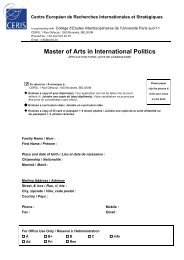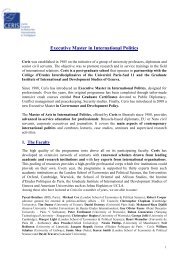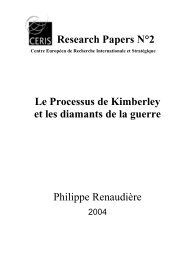hydropolitics of the tigris - euphrates river basin with - ceris.be
hydropolitics of the tigris - euphrates river basin with - ceris.be
hydropolitics of the tigris - euphrates river basin with - ceris.be
You also want an ePaper? Increase the reach of your titles
YUMPU automatically turns print PDFs into web optimized ePapers that Google loves.
The territorial sovereignty <strong>the</strong>ory is also known as <strong>the</strong> Harmon Doctrine, 65 which maintains that riparian<br />
states have exclusive (sovereign) rights over waters flowing through <strong>the</strong>ir territory. This justifies any type <strong>of</strong><br />
water use by <strong>the</strong> state, irregardless <strong>of</strong> <strong>the</strong> downstream impacts. Originating in <strong>the</strong> US, this law has <strong>be</strong>en<br />
rescinded in favour <strong>of</strong> more neighbour-friendly laws but Turkey has chosen to invoke it as part <strong>of</strong> <strong>the</strong>ir<br />
cause.<br />
The natural water flow <strong>the</strong>ory refers to territorial integrity <strong>of</strong> watercourses, stating that a <strong>river</strong> is a natural<br />
part <strong>of</strong> <strong>the</strong> territory <strong>of</strong> a riparian state and that <strong>the</strong> state is entitled to <strong>the</strong> natural flow <strong>of</strong> <strong>the</strong> <strong>river</strong>,<br />
unhampered by upstream riparians. This <strong>the</strong>ory is closely linked to <strong>the</strong> notion <strong>of</strong> historic rights or established<br />
user rights. 66 Syria and Iraq invoke <strong>the</strong>se principles, claiming Turkey must respect <strong>the</strong>m also.<br />
The concept <strong>of</strong> equitable apportionment is more recent and has its roots in <strong>the</strong> arena <strong>of</strong> international law<br />
relating to international watercourses. The term “international watercourse” was adopted by <strong>the</strong> UN<br />
International Law Commission and is part <strong>of</strong> <strong>the</strong> formulation <strong>of</strong> <strong>the</strong> Law <strong>of</strong> Non-Navigational Uses <strong>of</strong><br />
International Watercourses (<strong>the</strong> UN/ILC Law) that apply to waters which are situated in different states.<br />
Although first presented in 1959 it was not presented for ratification until 1997. In <strong>the</strong> interim, <strong>the</strong> most<br />
widely used law for use <strong>of</strong> International Rivers was drawn up in Helsinki in 1966. The Helsinki Law gave<br />
rights to existing uses <strong>of</strong> water on shared water resources and is based largely on <strong>the</strong> principle <strong>of</strong> equitable<br />
utilisation. It promoted <strong>the</strong> equitable distribution <strong>of</strong> uses and does not give any particular use a priority over<br />
<strong>the</strong> o<strong>the</strong>r.<br />
A relative ranking system has <strong>be</strong>en applied to help quantify equitable use for <strong>the</strong> Tigris-Euphrates Basin<br />
<strong>with</strong> <strong>the</strong> result that <strong>the</strong> calculated allocable share <strong>of</strong> water <strong>be</strong>tween Turkey, Syria and Iraq is almost equal. In<br />
his evaluations McQuarrie suggests that this methodology is unrealistic <strong>be</strong>cause it ranks each particular use,<br />
such as food security, as having equal weighting or importance for all countries. For example Syria would<br />
place a higher priority over food security than Turkey, while Turkey would emphasise hydro-electric energy<br />
(and subsequent economic development) over irrigation to provide <strong>the</strong> same security. The model also<br />
requires a certain data reliability, which is not yet available in <strong>the</strong> region and does not include political or<br />
security concerns for each country; aspects which frequently dominate economic and social agendas. Finally,<br />
McQuarrie pragmatically points out that <strong>with</strong> such a model Turkey would ultimately lose from a sovereignty<br />
point <strong>of</strong> view and that, for <strong>the</strong> moment, <strong>the</strong>re are no sanctions for not accepting <strong>the</strong> UN/ILC Law. 67<br />
26





